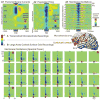The human K-complex represents an isolated cortical down-state
- PMID: 19461004
- PMCID: PMC3715654
- DOI: 10.1126/science.1169626
The human K-complex represents an isolated cortical down-state
Abstract
The electroencephalogram (EEG) is a mainstay of clinical neurology and is tightly correlated with brain function, but the specific currents generating human EEG elements remain poorly specified because of a lack of microphysiological recordings. The largest event in healthy human EEGs is the K-complex (KC), which occurs in slow-wave sleep. Here, we show that KCs are generated in widespread cortical areas by outward dendritic currents in the middle and upper cortical layers, accompanied by decreased broadband EEG power and decreased neuronal firing, which demonstrate a steep decline in network activity. Thus, KCs are isolated "down-states," a fundamental cortico-thalamic processing mode already characterized in animals. This correspondence is compatible with proposed contributions of the KC to sleep preservation and memory consolidation.
Figures



Comment in
-
Comment on "The human K-complex represents an isolated cortical down-state".Science. 2010 Oct 1;330(6000):35; author reply 35. doi: 10.1126/science.1182138. Science. 2010. PMID: 20929794
References
Publication types
MeSH terms
Grants and funding
LinkOut - more resources
Full Text Sources
Other Literature Sources

